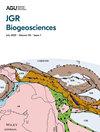Assimilation of Sentinel-1 Backscatter to Update AquaCrop Estimates of Soil Moisture and Crop Biomass
Abstract
This study assesses the potential of regional microwave backscatter data assimilation (DA) in AquaCrop for the first time, using NASA's Land Information System. The objective is to assess whether the assimilation setup can improve surface soil moisture (SSM) and crop biomass estimates. SSM and crop biomass simulations from AquaCrop were updated using Sentinel-1 synthetic aperture radar observations, over three regions in Europe in two separate DA experiments. The first experiment concerned updating SSM using VV-polarized backscatter and the corrections were propagated via the model to the biomass. In the second experiment, the DA setup was extended by also updating the biomass with VH-polarized backscatter. SSM was evaluated with local in situ data and with downscaled Soil Moisture Active Passive (SMAP) retrievals for all cropland grid cells, whereas crop biomass was compared to SMAP vegetation optical depth and the Copernicus dry matter productivity. The assimilation showed mixed results for root mean square error and Pearson's correlation, with slight overall improvements in the (anomaly) correlations of updated SSM relative to independent in situ and satellite data. By contrast, the biomass estimates obtained with backscatter DA did not agree better with reference data sets. Overall, the SSM evaluation showed that there is potential in using Sentinel-1 backscatter for assimilation in AquaCrop, but the present setup was not able to improve crop biomass estimates. Our study reveals how the complex interaction between SSM, crop biomass and backscatter affect the impact and performance of DA, offering insight into ways to optimize DA for crop growth estimation.


 求助内容:
求助内容: 应助结果提醒方式:
应助结果提醒方式:


